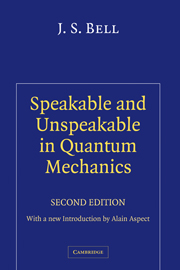Book contents
- Frontmatter
- Contents
- List of papers on quantum philosophy by J. S. Bell
- Preface to the first edition
- Acknowledgements
- Introduction: John Bell and the second quantum revolution
- 1 On the problem of hidden variables in quantum mechanics
- 2 On the Einstein–Podolsky–Rosen paradox
- 3 The moral aspect of quantum mechanics
- 4 Introduction to the hidden-variable question
- 5 Subject and object
- 6 On wave packet reduction in the Coleman–Hepp model
- 7 The theory of local beables
- 8 Locality in quantum mechanics: reply to critics
- 9 How to teach special relativity
- 10 Einstein–Podolsky–Rosen experiments
- 11 The measurement theory of Everett and de Broglie's pilot wave
- 12 Free variables and local causality
- 13 Atomic-cascade photons and quantum-mechanical nonlocality
- 14 de Broglie–Bohm, delayed-choice double-slit experiment, and density matrix
- 15 Quantum mechanics for cosmologists
- 16 Bertlmann's socks and the nature of reality
- 17 On the impossible pilot wave
- 18 Speakable and unspeakable in quantum mechanics
- 19 Beables for quantum field theory
- 20 Six possible worlds of quantum mechanics
- 21 EPR correlations and EPW distributions
- 22 Are there quantum jumps?
- 23 Against ‘measurement’
- 24 La nouvelle cuisine
17 - On the impossible pilot wave
Published online by Cambridge University Press: 11 April 2011
- Frontmatter
- Contents
- List of papers on quantum philosophy by J. S. Bell
- Preface to the first edition
- Acknowledgements
- Introduction: John Bell and the second quantum revolution
- 1 On the problem of hidden variables in quantum mechanics
- 2 On the Einstein–Podolsky–Rosen paradox
- 3 The moral aspect of quantum mechanics
- 4 Introduction to the hidden-variable question
- 5 Subject and object
- 6 On wave packet reduction in the Coleman–Hepp model
- 7 The theory of local beables
- 8 Locality in quantum mechanics: reply to critics
- 9 How to teach special relativity
- 10 Einstein–Podolsky–Rosen experiments
- 11 The measurement theory of Everett and de Broglie's pilot wave
- 12 Free variables and local causality
- 13 Atomic-cascade photons and quantum-mechanical nonlocality
- 14 de Broglie–Bohm, delayed-choice double-slit experiment, and density matrix
- 15 Quantum mechanics for cosmologists
- 16 Bertlmann's socks and the nature of reality
- 17 On the impossible pilot wave
- 18 Speakable and unspeakable in quantum mechanics
- 19 Beables for quantum field theory
- 20 Six possible worlds of quantum mechanics
- 21 EPR correlations and EPW distributions
- 22 Are there quantum jumps?
- 23 Against ‘measurement’
- 24 La nouvelle cuisine
Summary
Introduction
When I was a student I had much difficulty with quantum mechanics. It was comforting to find that even Einstein had had such difficulties for a long time. Indeed they had led him to the heretical conclusion that something was missing in the theory: ‘I am, in fact, rather firmly convinced that the essentially statistical character of contemporary quantum theory is solely to be ascribed to the fact that this (theory) operates with an incomplete description of physical systems.’
More explicitly, in ‘a complete physical description, the statistical quantum theory would … take an approximately analogous position to the statistical mechanics within the framework of classical mechanics …’.
Einstein did not seem to know that this possibility, of peaceful coexistence between quantum statistical predictions and a more complete theoretical description, had been disposed of with great rigour by J. von Neumann. I myself did not know von Neumann's demonstration at first hand, for at that time it was available only in German, which I could not read. However I knew of it from the beautiful book by Born, Natural Philosophy of Cause and Chance, which was in fact one of the highlights of my physics education. Discussing how physics might develop Born wrote: ‘I expect … that we shall have to sacrifice some current ideas and to use still more abstract methods. However these are only opinions.
- Type
- Chapter
- Information
- Speakable and Unspeakable in Quantum MechanicsCollected Papers on Quantum Philosophy, pp. 159 - 168Publisher: Cambridge University PressPrint publication year: 2004
- 1
- Cited by



